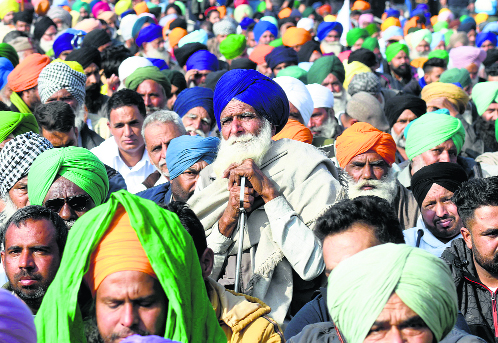At protest sites, icons of agricultural leaders
Rajmeet singh
Tribune Press Service
Singhu Border, 13 December
Amid the roar of slogans and speeches in the rostrum, with the speaker after Prime Minister Narendra Modi for allegedly seeking to corporatize agriculture, fear is palpable among protesting farmers as they seek a political option to safeguard their interests.
Do we want “our own” political team to warn the farmers? If the minimum value of wheat and rice disappears, will the value of irrigated farmland fall further? Do our peasant leaders have a political vision? These thought-provoking issues preoccupy young and old as protesters retreat to their base camps after the day’s busy schedule. or the Aam Aadmi party.
As no politician was welcomed on the “protest scene”, the leaders of the farmers’ unions, including Joginder Singh Ugrahan, Sukhdev Singh Kokrikalan, Jagmohan Singh Dakaunda and Balbir Singh Rajewal, icons of the “kisan andolan”. They occupy the area on social networks as well as digital, print and visual media platforms.
While other young people express their considerations with their “new leaders” about the 3 central agricultural laws, trade union leader Bharatiya Kisan (Rajewal), Balbir Singh Rajewal, tells them it can take a long time.
Anger and anguish opposed to the political formula are written on the faces of protesters. Gurpreet, who represents a group of progressive farmers from Ghanaur to Patiala, takes on his “double weight. “
“We are that groundwater is falling dramatically due to classic crops and that insecticides are overuse, but successive governments have made no effort to get farmers to abandon wheat and rice. Attempts to publicize diversification have been fruitless!” he says.
“All (politicians) are exposed. Political parties are involved in their own survival amid a replacement in dynamics,” says Parminder Singh of Chakdana village in Nawanshahr.
Otherwise, due to loyalty to other political parties, protest youth are no longer proud to be known as “Congressi” or “Akali. “”We are farmers and we are united here for a non-unusual cause,” says Raju of the village of Aulakh in Gurdaspur.
The Tribune has two sister publications, Punjabi Tribune (in punjabi) and Dainik Tribune (in Hindi).

